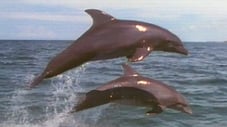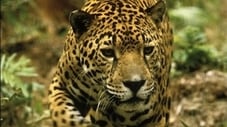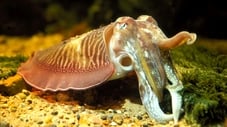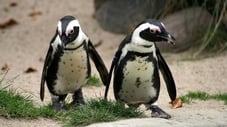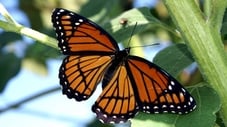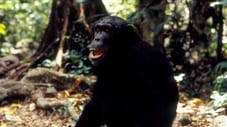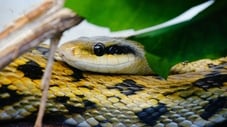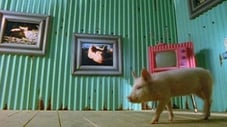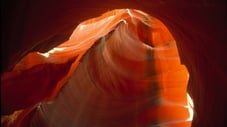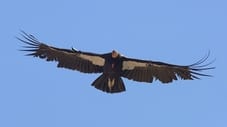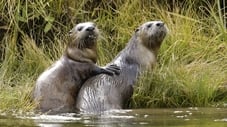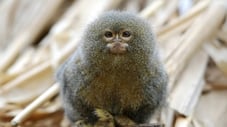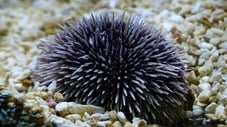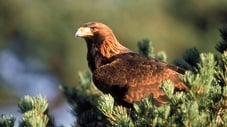
Nature (1982)
← Back to main
George Page as Narrator (voice), Host
Episodes 206
Why Bees Are Important
Scientists and bee experts discuss the crucial role that honeybees, a "keystone species," play in our economy and ecosystems, as well as bees' fascinating social organization and what we can do to reverse the decline of nature's pollinators.
Read MoreThe Flight of the Condor: Ice, Wind, and Fire
Following the path of the condor, whose ten-foot wingspan enables it to soar effortlessly over the peaks of the Andes mountains, this film starts at the storm beaten rocks of Cape Horn at the southern tip of South America and journeys north to the highest peak in the Americas - Aconcagua. Along the way, we see exotic animals and birds such as the penguin, hummingbird, sea otter, guanaco, ostrich-like rhea, and puma.
Read MoreThe Flight of the Condor: Ocean, Desert, and Thin Air
While the cold waters of the Pacific Coast of South America are among the richest in the world, the shore is the driest desert in the world. Yet it is not at all devoid of life. Lizards snatch morsels from the waves, and seagulls fly 40 miles into the desert to nest. The condor searches for carrion and vampire bats feed on the blood of sleeping sea lions. This is a beautiful portrait of a giant land.
Read MoreThe Flight of the Condor: Down the Amazon
The third part of the series is a spectacular visual trip down the fabled river. From the snow-clad summit of the volcano Cotopaxi and others comes the greatest river in the world as melting ice creates a torrent that drops three miles in its first short distance. The river is fed by magnificent waterfalls and is channeled through gorges out into the tropical rain forest where there are more species of birds than anywhere.
Read MoreAmate: The Great Fig Tree
We don't have an overview translated in English. Help us expand our database by adding one.
Kopje: A Rock for All Seasons
We don't have an overview translated in English. Help us expand our database by adding one.
On the Edge of Paradise
Examines the fragile ecology of the Caribbean area in a unique and vivid look at the forces affecting this area's ecological balance, such as hurricanes, volcanoes, the continuing evolution of different wildlife and man's influence. International agreements and commissions created to protect the Caribbean area are also covered.
Read MoreForest in the Clouds
Surveying Costa Rica's Monte Verde preserve, which contains some 200 varieties of trees, including 300-ft. oaks. Animal life includes deadly scorpions; army ants; and plumed quetzals, sacred bird of the Maya civilization.
Read MoreThe Discovery of Animal Behavior: Natural Mysteries
The first of the series takes us back to the 13th Century to explore medieval superstitions of ancient "naturalists." Frederick II of Hohenstaufen had a passion for falconry that resulted in his immense illustrated book De Arte Venandi Cum Artibus (On the Art of Hunting With Birds.) Series host is Dr. Donald Johanson, noted paleoanthropologist and director of the Institute of Human Origins in Berkeley, California.
Read MoreThe Discovery of Animal Behavior: In Praise of God
Theologians and clerics in the 17th and 18th centuries were among the first to study animal behavior. John Ray began in the 1600's to catalog "the work of the Creation," starting with plants and later including birds. Sir Francis Willoughby continued this work. Rev. Gilbert White studied bird songs, Charlie LeRoy experimented with wolves and deer, and Charles Waterton wrote about jungle animals.
Read MoreThe Discovery of Animal Behavior: Search for the Mind
In 1848, Charles Darwin began the quest to understand the mysteries of the animal mind. Following Darwin's achievement - suggesting a plausible process for evolution: natural selection - Lewis Henry Morgan discovered evidence of cogitation in beavers. George Romanes experimented with fish, cats, and dogs, Douglas Spalding with newborn chicks, all finding apparent mental activity. Meanwhile Jacques Loeb attempted to prove animals "mindless."
Read MoreThe Discovery of Animal Behavior: A Question of Learning
First there is a re-creation of Ivan Pavlov's experiments which led to the discovery of the "conditioned reflex." Then we see the investigation by Otto Pfungst of "Kluge Hans" (Clever Hans) a horse whose apparent knowledge of arithmetic was actually response to subtle signals from his trainer. We also see dramatizations of Thomdike's experiments with chicks, Watson's with terns, and B. F. Skinner's famed work at Harvard in the thirties.
Read MoreThe Discovery of Animal Behavior: Signs and Signals
Continuing with the exploration of animal communication we see recreations of Karl von Frisch unraveling the language of honey bees. Julian Huxley, who discovered a possible language in the ritual movements of great-crested grebes, Konrad Lorenz who recorded the visual language of geese, and Niko Tinbergen, who studied the habits of hunting wasps and together with Esther Cullen recorded the relationship of temperament in birds to their habitat.
Read MoreThe Discovery of Animal Behavior: Living Together
Scientists have long attempted to discover why animals rarely live alone. Animal society seems to be based on despotic rule by the strongest, tempered by the powerful attractive forces of sex. Portrayals of Thorlief Schjelderup-Ebbe, Solly Zuckerman, Clarence Ray Carpenter, Frank Fraser Darling, William Hamilton, and Amotz Zahavi, show the contributions of each of these men towards understanding the puzzle.
Read MoreForest in the Sea
The vast areas of kelp growing on the bottom of the Pacific Ocean provide a vital food source for countless creatures.
Read MoreFungi: The Rotten World About Us
As an agent of decay, fungi performs a function essential to life on earth.
Read MoreAcacia: Tree of Thorns
A great variety of wildlife species live in and around the thorny acacia trees on the African plains.
Read MoreOn the Tracks of the Wild Otter
Wildlife photographer Hugh Miles finds an opportunity to film a female otter on one of the remote Shetland islands.
Read MoreSecret Weapons
Insects such as the beetle, firefly and moth make use of their natural chemicals as weapons against their enemies.
Read MoreVoices in the Forest
The time-honored and ritualistic relationship of the highland peoples of Papua, New Guinea, to the birds of paradise is examined.
Read MoreBig Business in Bees
Examined is the giant industry of bee cultivation in the U.S. and its relation to the billions of dollars annually at stake in the alfalfa crop.
Read MoreJet Set Wildlife
An examination of the effects of alien plants and animals on Florida’s resident wildlife, agriculture, commerce and health.
Read MoreThe Masterbuilders
An examination of the nest-building habits of birds in various parts of the world.
Read MorePlight of the Bumblebee
The life cycle of the bumblebee is compared to that of humans in order to explain the “energy crisis” confronting the insects.
Read MoreThe Missing Monsoon
The will of wildlife to survive is documented by photographers Stanley Breedon and Belinda Wright at the Keola Deo National Park in India during one of the droughts that occurs every 20 to 30 years when the monsoons do not come.
Read MoreResurrection at Truk Lagoon
An exploration of the sunken Japanese war machinery destroyed by the Allies during World War II in the South Pacific, which provides an environment for underwater plant and animal life.
Read MoreKrakatoa: The Day that Shook the World
An examination of the Indonesian volcanic island Krakatoa, focusing on the global effects of the disastrous 1883 eruption that was heard 3,000 miles away and killed 36,000 people.
Read MoreTreasures of the Gulf
How the war between Iran and Iraq is threatening the fragile ecology of the Persian Gulf.
Read MoreSexual Encounters of the Floral Kind
How various species of plant life lure insects and animals to effect the pollination process.
Read MoreFragments of Eden
Explores the varieties of plant and animal life found in the Seychelles, a 90-island archipelago in the Indian Ocean, described in 1609 as “an earthly paradise”.
Read MoreThe Face of the Deep
Examines the variety of plants and animals living in the Sargasso Sea, a gigantic floating bed of seaweed near Bermuda.
Read MoreYellowstone in Winter
Natural history photographer Wolfgang Bayer documents a winter spent in Yellowstone National Park.
Read MoreWinter Days
Describes how wildlife copes with the challenge of cold weather by storing food building layers of fat, hibernating or merely fleeing for a warmer climate
Read MoreKilimanjaro
We don't have an overview translated in English. Help us expand our database by adding one.
Danube Delta
An examination of the Danube delta on the Black Sea where industrialization threatens the areas wildlife.
Read MoreTumbler in the Sky
Examines the breeding and nesting cycles of Africa’s Bateleur eagles.
Read MoreKinabalu: Summit of Borneo
A look at the unusual plant and animal life on Kinabalu, Borneo's highest mountain.
Read MoreBirds of Paradox
A survey of the birds that cannot fly, some of which have evolved highly efficient means of travel on land and water.
Read MoreLost World of the Medusa
An exploration of life forms, flourishing in the tropical islands of Palau, including schools of jellyfish.
Read MoreKitum - The Elephant Cave
African elephants are observed on a risky trek to a cave that provides salts and minerals necessary to their diets.
Read MoreRhino on the Run
A study of the history and plight of the rhinoceros, one of the most seriously endangered species on earth.
Read MoreThrough Animal Eyes
The use of new camera lenses and special video techniques makes it possible for viewers to see the world as animals and insects observe it.
Read MoreMan's Best Friend
This profile of the world's most popular household pet, the dog, examines a special, centuries old relationship.
Read MoreNamaqualand: Diary of a Desert Garden
An exploration of a windy semi-desert in southwest Africa notable for its beautiful flowers.
Read MoreAnd Then the Rains Came
Torrential rains flood Kenya’s Tsavo Plain triggering a cycle of animal and plant regeneration that flowers in the short period before the next drought.
Read MoreBattle of the Leaves
How plants and their leaves adapt to different climates, predatory animals and man.
Read MoreThe Ganges Gharial
A five-year chronicle of India’s endangered gharial crocodile.
Read MoreOne Man’s Island
The year-long sojourn of artist and naturalist Keith Brockie on Scotland's Isle of May is captured on film.
Read MoreSelva Verde: The Green Jungle
An exploration of the ecosystem of Central America's rain forest.
Read MoreThe Plant Hunters
An exploration of the scientific research into the nutritional, medicinal and economic value of plants.
Read MoreKalahari: Wilderness Without Water
An examination of the diverse plants and animals that have adapted to the harsh environment of the Kalahari Desert in South Africa.
Read MoreEmas: High Plains of Brazil
A visit to Brazil's national park Emas, home to a unique collection of rare and unusual wildlife.
Read MoreThe Feathered Swarm
The huge mating flocks of the East African quelea, feared by farmers almost as much as they fear locusts.
Read MoreKingdom of the Ice Bear: The Frozen Ocean
A look at sea creatures of the Arctic including planktonic animals, small crustaceans, seals, belugas, tucked narwhals and polar bears.
Read MoreKingdom of the Ice Bear: Land of Beyond
After the nine-month Arctic winter, lemmings, hares, foxes and caribous become active to raise their young.
Read MoreKingdom of the Ice Bear: The Final Challenge
A study of man’s relationship with the Arctic and its wildlife.
Read MoreSaguaro: Sentinel of the Desert
Wolfgang Bayer focuses on the native giant saguaro cactus of the southwestern United States.
Read MoreDeath Trap
The sophisticated trapping mechanism of the main group of carnivorous plants.
Read MoreAspen: Dancer on the Wind
A look at the trembling aspen, a widely distributed poplar found in more regions of North America than any other tree.
Read MoreSecrets of an African Jungle
The fragile ecosystem of the great African rainforest of Korup in Cameroon.
Read MoreBirdwatch from Florida
Chronicling a weeklong series of bird-watching activities at sites that include the Anhinga Trail in the Everglades, Tampa Bay Island and Port Orange.
Read MoreThe Gooneys of Midway
Wildlife cinematographer Wolfgang Bayer focuses on the Laysan Albatross of the Hawaiian Islands.
Read MoreWhere Eagles Fly
A five year study of the golden eagle, Britain's largest bird of prey, in the Scottish highlands.
Read MoreThe Skyhunters
An examination of the vultures of Africa's Serengeti plain and the rainforests of South America.
Read MoreAlyeska: The Great Land
Examines how the plants and animals of Alaska’s Alyeska wilderness have adapted to the regions harsh climate.
Read MoreBaja Lagoon
An examination of the plants and animals that make their home in a shallow lagoon found on the Western coast of Mexico’s Baja Peninsula.
Read MoreGalapagos: How They Got There
This exploration of the Galapagos Islands, located in the Pacific Ocean West of Ecuador, examines theories explaining the arrival of wildlife to the archipelago.
Read MoreGalapagos: Cold on the Equator
Marine iguanas, cormorants, green turtles, sea lions, and sperm whales are among the animals that thrive in the cold waters surrounding the equatorially located Galapagos Islands.
Read MoreGalapagos: The Ocean Travelers
A look at the Galapagos Islands’ many birds, include the waved albatross, blue-footed booby, frigate bird and the ground finch; also, man’s relationship with the islands’ changing environment.
Read MorePantanal: Prairie of the Great Waters
A look at how the Pantanal's wildlife species cope with the annual cycle of flood and drought which transforms the marshy prairie from a dry savannah into the world's largest freshwater wetland – a 36,000 square-mile area that encompasses Southwestern Brazil and parts of Bolivia and Paraguay.
Read MoreLeopard: A Darkness in the Grass
The activities of an elusive female leopard are traced over a two-day period on the hot plains of Africa.
Read MoreThe Elephant Challenge
A look at the survival of the African elephants, as ivory and foraging land became more valuable.
Read MoreIchkeul: Between the Desert and the Deep Blue Sea
A freshwater lake in Tunisia that turns salty every summer.
Read MoreIn the Shadow of Fujisan: See No Evil
The Japanese take efforts to save an indigenous monkey.
Read MoreIn the Shadow of Fujisan: Bird of Happiness
A look at the crane, Japanese symbol of longevity, true love and happiness.
Read MoreIn the Shadow of Fujisan: Long Live the Turtle
Hunters and egg poachers threaten the existence of the giant loggerhead turtle.
Read MoreAmerica's Wild Horses
Following the wild mustangs of America’s West.
Read MoreHoly Land: A Wilderness Like Eden
An exploration of the Rift Valley that sweeps North from Kenya to Turkey, where prophets said their god first planted a garden.
Read MoreHoly Land: Sweet Water, Bitter Sea
The unusual life in the salty Dead Sea, where the desert plunges 1,200 feet below sea level.
Read MoreThe Forgotten Garden
What happens when a finely maintained garden is abandoned.
Read MoreLords of Hokkaido
A year on a Japanese island following a family of red foxes.
Read MoreDesigned for Living
The tunnelers, thatchers, weavers, dam builders, sculptors, potters and spinners of the animal kingdom.
Read MoreMasked Monkeys
Echoing hoots and trills, bandit masks, feathered tufts and orange noses distinguish African forest monkeys called quenons.
Read MoreThe Flowing Oasis
Wildlife flourishes in Nevada's desert landscape because of one narrow river covering less than 1% of the land.
Read MoreAmazonia: A Burning Question
Attempts to protect the unique animals and plants of Brazil threatened by development of the Amazon jungle.
Read MoreSpirits of the Forest
The lemur, an agile nocturnal primate of Madagascar, so-named because of its secretive habits and haunting cries.
Read MorePerspectives of Paradise
The process of wildlife filmmaking as chronicled by a crew during their three-year study of the Galapagos Islands.
Read MoreA Season in the Sun
The tremendous difference in animal lifestyle and in landscape during East Africa's dry season and its wet season.
Read MoreThe Legend of the Lightning Bird
The hammerhead stork, believed by East African tribesmen to have the power to call lightning from the sky.
Read MoreThe Volcano Watchers
Scientists Katia and Maurice Krafft seek to uncover the mystery of volcanoes by studying them on location as they erupt.
Read MoreLand of the Kiwi
Unusual wildlife inhabitants, beautiful terrain and natural wonders grace the Pacific islands comprising New Zealand.
Read MoreCosta Rica: Paradise Reclaimed
U.S. scientist Dan Janzen uses innovative conservation plans to create a national park amid a tropical forest.
Read MoreIn-Flight Movie: Birds of the Sun God
Close-up film captures birds in-flight; tiny hummingbirds draw nectar while hovering above flowers.
Read MoreHawaii: Islands of the Fire Goddess
A Hawaiian island evolves from underwater volcano to snow-capped mountain and finally to coral atoll.
Read MoreOkavango, Jewel of the Kalahari: The Search for the Jewel
The first of a three-part survey of "Okavango: Jewel of the Kalahari" describes how earthquakes diverted the Okavango River into Botswana's Kalahari Desert. Observed: elephants, zebras, buffaloes, vultures, ostriches, bush babies and bat-eared foxes.
Read MoreOkavango, Jewel of the Kalahari: The Living Jewel
Creatures of the air, trees and water brave the five-month floods through the Okavango delta. Part 2 of "Okavango: Jewel of the Kalahari," observes African skimmers, lily trotters, baboons, dwarf mouth-breeders, tiger fish and catfishlike squeakers.
Read MoreOkavango, Jewel of the Kalahari: A New Challenge
People of Botswana must balance wildlife protection with preservation of their precious water source.
Read MoreGreat Moments with Nature's Filmmakers
A five-year retrospective includes clips from The Flight of the Condor, Leopard: A Darkness in the Grass, Kingdom of the Ice Bear, Cats, The Gooneys of Midway, and Yellowstone in Winter, with animals hunting, courting, rearing young and adapting to their environment.
Read MoreElephant: Lord of the Jungle
The Asian elephant is shown to be a creature of both great strength and intelligence.
Read MoreMiracle of the Scarlet Salmon
After two years in the Pacific, the sockeye salmon battles rapids returning to its birthplace to spawn.
Read MoreCowboys, Caimans and Capybaras
Ranchers and scientists practice conservationism in Venezuelan and Colombian grasslands to protect native animals.
Read MoreTom's River: Reflections of a River Keeper
Naturalist Tom Williams studies England's Avon River and the fish and fowl it supports.
Read MoreThe Elephant Challenge
A growing African population threatens elephant survival by farming its foraging land and hunting the beast for ivory.
Read MoreThe Coral Triangle
An exploration of the coral reefs of the Malay Triangle made up of the Philippines, Malaysia and New Guinea.
Read MoreBonebreakers' Mountain
An exploration of the Spanish Pyrenees mountains and the bearded "bonebreaker" vulture that lives in this harsh environment.
Read MoreExtremadura: Spain's Forgotten Forest
Explores Spain's Extremadura, an oak forest and wilderness plain, home to griffin vultures, imperial eagles, genets and other animals native to Africa.
Read MorePeacock's War
Former Vietnam medic Doug Peacock lives as a firewatcher and conservationist in Montana's Glacier National Park.
Read MoreNature of Australia: a Portrait of the Island Continent: A Separate Creation
Examines marsupials and others animals which have evolved because of Australia's isolation from the rest of the world.
Read MoreNature of Australia: a Portrait of the Island Continent: Seas Under Capricorn
Two distinct marine worlds meet in the waters that encircle Australia. In its long voyage into isolation following its breakaway from Gondwana, 45 million years ago, the island continent came to span both tropical and temperate seas. Today its shores are ringed by the most diverse assemblies of marine life on earth. This program recounts the making of this unique Australia down under, from the storm tossed kelp forests of the cool south, to the magic splendours of the Great Barrier Reef. The program begins its story where Australia was born, in the southern latitudes of the Antarctic seas. Antarctica is the last remnant of Gondwana - it froze over after the other continents broke away, but its cool rich waters still generate a wealth of nutrients which, carried by the deep currents, sustain Australia's marine life.
Read MoreNature of Australia: a Portrait of the Island Continent: the Making of the Bush
A koala up a gumtree is the classic image of the Australian bush. How that odd partnership evolved is one of the strands woven into this episode of Nature Of Australia. The program tells the story of how the island continent's wooded margins came to be dominated by one unique type of tree growing in a great variety of forms - the eucalypt. The nursery for nearly all life in Australia is the rainforest, of which only a few patches remain today - th last remnants of vast, dense forests that covered Australia when it first broke away from the ancestral super-continent of Gondwana, and voyaged north into isolation. From among its proliferation of plants emerged the eucalypts, the characteristic gum trees - and from among the forest animals arose a great and varied company of marsupials, adapting to every kind of environment that evolved in response to Australia's changing, drying climate.
Read MoreNature of Australia: a Portrait of the Island Continent: the Sunburnt Country
Australia's arid interior is often called the dead heart. In fact, it teems with life, supported by a hidden network of buried rivers recharged by rare but heavy rains. This episode tells the story of this surprising desert - formed when the climatic change overtook and dried out central Australia. What was once a land of vast lakes and broad rivers turned into a parched region of glittering stone and burning sand, interwoven with swathes of hardy woodland and plains of desert grass. A great variety of plants and animals has adapted to life in the arid centre, with its swings between the brief good condition that follow the unpredictable rains, and then long periods of drought. It's the land of the lizards - from giant goannas that sniff out snakes hiding under the sand, to the tiny, delicate Lake Eyre dragons who've made the desolate saltpans their domain.
Read MoreNature of Australia: a Portrait of the Island Continent: the Land of Flood and Fire
Australia's northward drift slowed down when it collided with Asia about 15 million years ago - in the upheavals, chains of islands were thrust up and eventually they became the stepping stones for an invasion that would change the face of Australia. With the arrival of the first humans - at least 50,000 and possibly as long as 120,000 year ago - a new force entered the continent to shape the fortunes of its plants and animals. The first landfall was on the far north coast of Australia, a rich and tropical region ruled by the annual monsoonal rains. This program tells the story of Australia's top end, where the first Aboriginal people arrived, settled, and perfected the use of fire as a means to manage the landscape.
Read MoreNature of Australia: A Portrait of the Island Continent: End of Isolation
Modern Australians want to recapture the Aborigines ability to live harmoniously with indigenous plants and animals.
Read MoreNight Hunters
The different types of owls and the characteristics which make them ideal birds of prey.
Read MoreBeyond Timbuktu
Wildlife artist Bruce Pearson sketches the various bird species found in the arid lands of Western Africa's Mali, through which the River Niger flows.
Read MoreUnder the Emerald Sea
Explores the Pacific Ocean off the coast of Vancouver, B.C.
Read MoreWild Waterfalls
Explores the variety of local environments found around waterfalls in Africa, South and North America.
Read MoreMeerkats United / The Bee-Team
Profiles of the Kalahari Desert's gray meerkat or mongoose, and a Kenyan colony of bee-eater birds.
Read MoreMozu the Snow Monkey
Chronicling the life of "Mozu the Snow Monkey," a macaque with deformed limbs that's survived harsh winters in Japan's highlands to raise seven offspring. The complex social structure among the primates is documented.
Read MoreThe Everglades: Rain Machine
Examines the role computers play in managing the Everglades and whether this vital freshwater marsh will survive the effects of diking, draining and development.
Read MoreIslands in the Sky
Unique animals and plants flourish atop mist-shrouded Venezuelan plateaus thousands of feet above the surrounding jungle.
Read MoreRulers of the Wind
Scientists study birds of prey, creatures historically admired and hated, as indicators of environmental damage.
Read MoreKariba: the Lake that Made a Dent
Wildlife flourishes around the manmade lake conservationists denounced 30 years ago at its creation.
Read MoreThe Great Rift: Footprints in the Valley
The area's evolutionary roots opens this look at the African valley.
Read MoreThe Great Rift: Out of the Ashes
The wildlife that lives on the Great Rift's ash plains.
Read MoreThe Great Rift: Breaking the Continent
Examines the Red Sea, the island of Madagascar and East Africa.
Read MoreUnder the Ice
Soft coral, sponges, tubeworms, anemones and giant cod adapt to life in Antarctica's subzero waters.
Read MoreLand of Dragons
Profiles the wildlife living within the British crown colony of Hong Kong
Read MoreThe Great Wood of Caledon
An exploration of the Caledonian forest in Scotland, Britain's largest remaining area of ancient woodland.
Read MoreForest of Fear
A look at the maneating tigers of the Sundarbans delta in India.
Read MoreGran Paradiso
Resource management in Italy's alpine Gran Paradiso National Park has consequences beyond the parks boundaries.
Read MoreCranes of the Grey Wind
Scientists study sandhill cranes on Nebraskan plains, Alaskan and Siberian coasts and in the Northwest Territories.
Read MoreKing Solomon's Mountains
The forests and waters of Ethiopia's Bale Mountains, may one day renew the country's depleted landscape.
Read MoreHunters of the Sky
A look at how Europe's birds of prey have adapted.
Read MoreA Wolf in the Fold
The relationship between working sheepdogs and flocks of sheep. Selective breeding yields a sheepdog with outstanding abilities to tend the creature other canines prey upon.
Read MoreThe Colorado
Tracing the course of the Colorado River.
Read MoreThe Emerald Isle
Thousands of years of human settlement provide the backdrop by which to discover the wildlife of Ireland.
Read MoreGiant Otters
The fur trade continues to threaten the South American otter with extinction, despite its status as an endangered species.
Read MoreThe Haida Gwai: Islands of the People
Profiles the Haida Indians who live on British Columbia's Queen Charlotte Island.
Read MorePresque Isle: Land in Motion
An exploration of the environmental impact of man's attempts to halt the erosion of Presque Isle beaches.
Read MoreYellowstone on Fire
The effect of the 1988 fire on the ecosystem of Yellowstone National Park.
Read MoreSeasons in the Sea
Sharks, rays, squids and blue whales live in the Pacific Ocean off the California coast.
Read MoreMonkeys on the Edge
Three species of monkeys, the muriqui, the golden lion tamarin and the buffy-headed marmoset struggle for survival in Brazil's coastal Atlantic Forest.
Read MoreScandinavia: Land of the Midnight Sun
A look at how Norway and Sweden are affected by eight months of winter.
Read MoreScandinavia: Fresh Waters, Salt Seas
A look at the Swedish archipelago and Norway's fjords.
Read MoreThe Sisterhood
Africa's spotted hyena is a matriarch dominated, efficient predator.
Read MoreSupersense: Sight and Sound
Sight and sound are experienced through animal eyes and ears.
Read MoreSupersense: Super Scents and Beyond
Enhanced olfactory sensitivity; unique animal senses.
Read MoreSupersense: Making Sense
Internal clocks guide life rhythms of eating, sleeping, mating, hibernation, birth and death.
Read MoreMonkey Island
This program travels to the island of Cayo Santiago off Puerto Rico to study the behavioral patterns of a colony of feral Rhesus Macaques.
Read MoreGrizzly Country
Rangers at Denali National Park in Alaska train hikers for planned encounters with grizzlies; Alaskan grizzly bears are seen salmon fishing at Brooks Falls.
Read MoreThe Wild Shores of Patagonia
Penguins, maras, guanacos, sea lions and killer whales highlight this portrait of Patagonia.
Read MoreThe Gulf: Portrait of the War Zone
In light of the Persian Gulf War and the recent oil spills, PBS airs an update of the 1984 episode of Nature, Treasures of the Gulf, that focused on the effects of the Iran-Iraq war on the fragile ecology of the Persian Gulf.
Read MoreOne Man's Kenya
The beauty of the African plains and the effects of tourism on the area.
Read MoreThe Elephants of Tsavo: Love and Betrayal
Filmmaker Simon Trevor, a former game warden, records the decimation of African elephants.
Read MoreGrand Teton Wilderness
The natural and human history of the Grand Tetons and Jackson Hole, Wyoming.
Read MoreYear of the Jackal
Life within a close-knit golden jackal family on the plains of Lemuta in Africa.
Read MoreBlack Bear of the North
Biologist Lynn Rogers follows the black bear out of hibernation and into the Minnesota woods.
Read MoreWild Dogs of Africa
The relationship within a wild dog pack on Africa's Serengeti Plains.
Read MoreMarathon Bird
A profile of the albatross examines its traits and habitats, as well as the mysteries and myths surrounding it.
Read MoreThe Cat That Came in From the Cold
A polecat winters at a working farm in Wales, along with scavenging foxes, rats and birds.
Read MoreCrown of the Continent: Waterton/Glacier National Park
Grizzlies, wolves and cougars roam Montana's rugged, pristine Glacier National Park.
Read MoreFrom the Heart of the World: the Elder Brothers' Warning
This program features the Kogi tribe who live in the Sierra Nevada de Santa Marta in Columbia. They are pre-Columbian peoples, and consider themselves as the elder brothers of humankind. They insist that it is the modern world, the younger brothers, who are destroying the harmony of life on earth.
Read MoreVietnam: a Country, Not a War
Vietnam's wildlife is reappearing after the great losses suffered during the war.
Read MoreKali the Lion
Simon King films a lioness and her pride during winter on Africa's Serengeti plain.
Read MoreMadagascar: Island of Ghosts
A look at the environmental crisis on Madagascar and new conservation efforts being made.
Read MoreLand of the Eagle: the Great Encounter
This first episode in the miniseries explores the European discovery and settlement of the New World. Two views are presented, that of the colonists struggles to survive in their new and unfamiliar setting, as well as the Native Americans success within the same environment.
Read MoreLand of the Eagle: Confronting the Wilderness
A look at the colonization of Canada and the fur trade.
Read MoreLand of the Eagle: Conquering Swamps
A focus on the prospect of gold in the new world, and the Spanish exploration of Florida in search of that alluring metal.
Read MoreLand of the Eagle: Across the Seas of Grass
An exploration of the Great Plains of North American from the Lewis and Clark expedition through to the present day.
Read MoreLand of the Eagle: Into the Shining Mountains
A focus on the Rocky Mountains and Yellowstone National Park.
Read MoreLand of the Eagle: Living on the Edge
A look at life in the Sonoran Desert.
Read MoreLand of the Eagle: the First and Last Frontier
Exploring the people and wildlife of Alaska.
Read MoreLand of the Eagle: Searching for Paradise
This last episode in the miniseries looks at the landscape and wildlife of California.
Read MoreGreat Moments with Nature's Filmmakers
We don't have an overview translated in English. Help us expand our database by adding one.
Horse Tigers
This program follows a herd of zebras along their yearly migration route through the African plains.
Read MoreArctic Wanderers
Follows the yearly migration of the caribou of Alaska and the Yukon Territory in an effort to find suitable birthing grounds, all will trying to avoid wolves and other predators.
Read MoreLadakh: Kingdom in the Clouds
India's remote Ladakh region in the Himalaya Mountains, home to the snow leopard and other rare wildlife.
Read MoreTiwai: Island of the Apes
Chimpanzees and other primates survive on Tiwai, an Upper Guinea island where witchcraft and taboos still exist.
Read MoreA Celebration of Birds with Roger Tory Peterson
Roger Tory Peterson's fight to save America's birds and their habitats.
Read MoreElephant Seals: Those Magnificent Diving Machines
The life cycle of a female northern elephant seal is documented.
Read MoreDolphins: Close Encounters
Explores the lives of dolphins all around the world, and the scientists who are trying to communicate with them.
Read MoreLast Stand of the Giants
Loggers and conservationists have conflicting plans for ancient forests of redwoods, Douglas firs, hemlocks and Sitka spruce trees along the Northern Pacific rim.
Read MoreRealms of the Russian Bear: Green Jewel of the Caspian
This miniseries starts off by exploring the abundance of wildlife around the Volga Delta in Russia’s Astrakhan region.
Read MoreRealms of the Russian Bear: the Arctic Frontier
An exploration of the wildlife of the Russian Arctic, and in particular Wrangle Island, featuring polar bears, musk oxen, Ross’s Gulls, reindeer, foxes, walruses, and the Red-breasted Goose.
Read MoreRealms of the Russian Bear: the Red Deserts
A focus on the wildlife of the Central Asian deserts.
Read MoreRealms of the Russian Bear: the Celestial Mountains
Between China and Central Asia is the Tian Shan mountain range, home to Marco Polo sheep, white-clawed bears, snow leopards, yaks, and the ibex.
Read MoreRealms of the Russian Bear: Siberia, the Frozen Forest
A look at the wildlife in the huge Siberia forest reveals bears, elk, wolves, and musk deer among many other creatures in this frozen expanse.
Read MoreRealms of the Russian Bear: Born of Fire
This last program in the miniseries explores Kamchatka Peninsula where the Russian Arctic meets Southeast Asia. Home to perhaps the highest concentration of volcanoes in the world, this remote region is teeming with life both on land and in the sea, from the Amur Tiger to the Giant Pacific Octopus.
Read MoreShadows in a Desert Sea
Fish, bats, birds, whales, giant squids, sharks, dolphins, sea lions and more flourish in and around the Sea of Cortez.
Read MoreThe Tree of Music
The African Blackwood is prized the world over for its wood in the making of musical instruments. Nature takes you on a journey through the history of this “tree of music” and into modern day efforts in Tanzania to save this ever dwindling resource.
Read MoreSlaves to the Queen
Get right inside the hives of bees and wasps to see the inner workings of these complex societies.
Read MoreIce Fox: Struggle for Survival
A look at two separate families of arctic foxes. One living in the frozen, barren tundra of northern Russia, the other living in the slightly more comfortable surroundings of the Norwegian coastline.
Read MoreCheetahs in the Land of Lions
A study of cheetah behavior follows a mother and her cubs on the Serengeti plains.
Read MoreGorilla: King of the Congo
A gorilla orphanage and a proposed forest reserve may save the lowland gorilla.
Read MoreAmerican Trickster
As its numbers increase and its natural range diminishes, the coyote moves into populated regions like Los Angeles.
Read MoreHebrides: the Secret Islands
We don't have an overview translated in English. Help us expand our database by adding one.
Echo of the Elephants
In Kenya’s Amboseli National Park is a family of elephants led by its matriarch Echo. Elephant expert Cynthia Moss, takes us up-close and inside the lives of these magnificent animals.
Read MoreThe Ghosts of Ruby
We don't have an overview translated in English. Help us expand our database by adding one.
The Bandit and the Builder
Raccoon and beaver lifestyles in the Canadian wilderness.
Read MoreSpirit of the Sound
Exploration of Puget Sound's ecosystem.
Read MoreIn the Company of Wolves with Timothy Dalton
Timothy Dalton searches for wolf habitats in North America to learn more about the animal
Read MoreTreasure of the Andes
The history of llamas, alpacas, vicunas and guanacos in South America.
Read MoreEchoes from the Ice
The two-hundred-foot walls of ice in Glacier Bay overwhelm the senses, but they also surround the most beautiful sights Alaska has to offer — the Northern Lights, the roaming grizzly bears, and the humpback whales. The glacier itself is also creating new life — it has retreated some 70 miles up the bay, wiping the ecological slate clean, allowing new plants and animals to start again from scratch.
Read MoreThe Nature of Sex: the Primal Instinct
This program looks at the varied ways in which life reproduces. Whether a species has one sex, two sexes, both at once or none at all, the urge to procreate is there.
Read MoreThe Nature of Sex: a Time and a Place
Explores the various influences on mating and courtship, from the sun, the moon and the change of seasons, to the specific behaviors within species.
Read MoreThe Nature of Sex: The Sex Contract
Explores the selection process among different species for choosing a mate, whether it’s for life or just for the day.
Read MoreThe Nature of Sex: Sex and the Human Animal
An investigation into the origins of human sexuality and sexual roles.
Read MoreThe Nature of Sex: a Miracle in the Making
A look at the reproduction process from conception to birth of a wide variety of animals.
Read MoreThe Nature of Sex: Young Ones
A look at the parental process of all sorts of earth’s creatures.
Read MoreNature's Great African Moments
"Nature's Great African Moments" features clips from episodes focusing on the continent and its abundant wildlife. Included: wildebeests, zebras, lions, giraffes and flamingos.
Read MoreAnima Mundi: Before It's Too Late
"Anima Mundi" offers images of the natural world set to music; "Before It's Too Late" examines zoos' efforts to preserve endangered species. Included: attempts to restore near-extinct mammals to mainland Australia.
Read MorePhantom of the Forest
A study of the goshawk, a bird of prey that has been restored to the Scottish woodlands after being pushed to the brink of extinction. Included: the goshawk's courtship ritual; how chicks learn to fly.
Read MoreSea Otter Story: Warm Hearts & Cold Water
"A Sea Otter Story---Warm Hearts & Cold Water" examines a California aquarium's efforts to raise an otter and teach it necessary survival skills. Also: the impact of the 1989 Exxon Valdez oil spill on Alaskan otters.
Read MoreToadskin Spell
"Toadskin Spell" examines frogs and toads and how the qualities of their skin help them survive extreme climates. Included: toad-derived poisons, medicines and hallucinogens.
Read MoreIn the Lion's Den with Anthony Hopkins
Following Anthony Hopkins to Tanzania to study lions. Included: an encounter with Masai warriors; the lioness's role in the hunt; footage of zebras and wildebeests.
Read MorePandas of the Sleeping Dragon
This installment of PBS's multi-award winning Nature series delves into the life and history of the highly endangered giant panda. Nature: Pandas of the Sleeping Dragon studies the habits and habitats of the giant panda throughout China's Sleeping Dragon Mountains.
Read MoreWarts and All
"Warts and All" follows three generations of a wart-hog family over the course of a year. Observed: attacks by hyenas, leopards and flamingos; how wart-hog males fend for themselves from an early age.
Read MoreNomads of the Wind: The Faraway Heaven
The first programme in a five part series that combines wildlife footage with drama and documentary in exploring the fundamental relationship between man and nature across the Pacific Ocean. Explores the islands of Tahiti and Marquesas, which were settled some 2000 years ago by Polynesian seafarers.
Read MoreNomads of the Wind: Crossroads of the Pacific
We don't have an overview translated in English. Help us expand our database by adding one.
Nomads of the Wind: Burning Their Boats
We don't have an overview translated in English. Help us expand our database by adding one.
Nomads of the Wind: Distant Horizons
We don't have an overview translated in English. Help us expand our database by adding one.
Nomads of the Wind: The Pierced Sky
We don't have an overview translated in English. Help us expand our database by adding one.
Creatures in Crime
Following the work of forensic experts who use plants, insects and animals to help solve police cases. Included: how seeds on a blanket placed a rape suspect at a crime scene; how fly eggs helped police identify a serial killer.
Read MoreTigers with Bob Hoskins
Bob Hoskins travels through Sumatra, India and Nepal to learn about wild tigers.
Read MoreGhost Bear
Following a rare ghost bear, a black bear with all-white fur, as it hones survival skills on an island off the western coast of Canada. Included: salmon migration; preparations for hibernation; black gray wolves; killer whales.
Read MoreBorn to Run
Following a herd of Thomson's gazelles, a species that uses swift, “life-saving legs” to survive attacks by predators on Africa's Serengeti Plains. Included: their flight from cheetahs (their “greatest enemy”), jackals and hyenas; how “Tommies” travel in herds.
Read MoreNew Guinea: Island Invaders
"New Guinea: Island Invaders" explores the island, located north of Australia in the East Indies. Examined: the land bridge which enabled animals from Australia to cross over to New Guinea. Also: the marine crocodile
Read MoreNew Guinea: Other Worlds
"New Guinea: Other Worlds" explores the island's remote interior, home to the bird of paradise, which natives believe to have spiritual powers. Also: how gold prospectors came to the interior and were surprised to encounter people exclusively using stone-age tools.
Read MoreJaguar: Year of the Cat
"Jaguar: Year of the Cat" follows the predator in its native rain forests of Belize. Included: a pair stalk turtles, peccaries and armadillos; scenes of the habits of their animal neighbors, including toucans and ocelots.
Read MoreIncredible Suckers
NATURE takes you into the depths of the ocean to discover the most remarkable life still undiscovered on our planet that will certainly be found in the sea.
Read MoreMonkey in the Mirror
Considering the similarities between simian and human intelligence. Included: a chimpanzee demonstrating a sense of self, as he recognizes his own reflection; how certain chimps can use tools; a chimp species that has recreational sex.
Read MoreThe World of Penguins
Travel to "The World of Penguins” to discover the great variety of these aquatic birds.
Read MoreCastaways of Sulawesi
Exploring the Indonesian island of Sulawesi, formed when Asia and Australia separated, which combines elements of both continents. Included: crested black macaques; a reticulated python; the babirusa ("pig-deer"); red-knobbed hornbills; fruit bats.
Read MoreHunters of the Sea Wind
Following the "Hunters of the Sea Wind," predators that stalk a Pacific current for the thousands of fish it carries. Included: dolphins; yellowfin tuna; blue marlins; lantern fish; and sailfish. Also: tuna fishermen releasing dolphins from their nets.
Read MoreParrots: Look Who's Talking
A look at parrots, birds with a playful nature and remarkable mimicry skills that have endeared them to pet owners worldwide. Included: the largest parrot species, the hyacinth macaw; scarlet macaws, white cockatoos and monk parakeets.
Read MoreAlien Empire: Hardware & Replicators
"Alien Empire," a three-part exploration of the world of insects, begins with survival methods used by many species. Included: how exoskeletons provide protection and can be used offensively; unusual reproductive habits of mayflies and wasps.
Read MoreAlien Empire: Battlezone & Metropolis
Part 2 of "Alien Empire" delves into the violence and communal living that are at the core of insect life. Included: cockroach and butterfly eating techniques; highly effective termite killers called "assassin bugs."
Read MoreAlien Empire: Voyagers and War of the Worlds
"Alien Empire" concludes with a look at how insects have spread and how humans have tried to combat that expansion. Included: crickets that have adapted to climatic extremes; the threat posed by gypsy-moth caterpillars.
Read MoreJane Goodall's Wild Chimpanzees
Jane Goodall introduces a program that charts a "sweeping family saga" as it plays out among chimps in Tanzania's Gombe National Park. Observed: how the younger offspring try to capture their mother's attention.
Read MoreVictims of Venom
A look at snakes, sea creatures and plants that employ venom, either as a defense mechanism or as a way to disable prey. Included: king and Siamese cobras; scorpions; rattlesnakes; and the Australian blue-ringed octopus.
Read MoreCall of Kakadu
Exploring the wildlife and terrain in the wilderness of Australia's Kakadu National Park, where years are divided between droughts and monsoons. Included: Gouldian finches, sulphur-crested cockatoos, magpie geese, dingoes and wallabies
Read MoreMonsoon
Tracing the monsoon season when India receives most of its rain. Included: how the rains avert droughts on most of the subcontinent, but also cause massive flooding. Observed: gharial crocodiles; weaverbirds; Indian elephants; one-horned rhinos; langurs.
Read MoreSperm Whales: the Real Moby Dick
In the NATURE program SPERM WHALES: THE REAL MOBY DICK, the efforts of Jonathan Gordon and other researchers to study the whales' physicality, modes of communication, and social interactions contribute to our understanding of the underwater world.
Read MoreThe Crater Lions
Charting the declining fortunes of a pride of "Crater Lions" that lives in Tanzania's Ngorongoro Crater. Included: lion attacks on buffaloes; a young cub's encounter with jackals; efforts to repopulate the pride; wildebeests, elephants
Read MoreMask of the Mandrill
Delving into the mysteries of the colorful monkeys called mandrills, as a troupe of the creatures are followed through the West African rainforests. Included: the travails of a lead male fighting off a rival; the females' role as group leaders; hammerhead bats and river martins.
Read MoreThe Joy of Pigs
Exploring pigs, described by host George Page as “the world's most cosmopolitan characters,” with a focus on their adaptability to a variety of environments. Included: pigs as pets; hunters stalking a “bearded” pig in Borneo.
Read MoreEcho of the Elephants: The Next Generation
Following a family of elephants in Kenya's Amboseli National Park. Included: the family's matriarch giving birth, rescuing her kidnapped daughter and chasing away hyenas. Also: male and female mating rituals.
Read MoreWolves and Buffalo: The Last Frontier
Observing wild buffaloes and gray wolves in the Canadian wilderness. Jeff and Sue Turner spent two years filming the ritual battles between these ancient adversaries in Wood Buffalo National Park, where the drama unfolds in the subarctic winter.
Read MoreThe Elephant Men
Profiling the mahouts of southern India, who are skilled in the art of training wild elephants. Included: a journey north to stop herds of marauding elephants that are destroying villagers' crops and taking lives.
Read MoreA Lemur's Tale
Deep in the thorn forests of Madagascar live troops of ring-tailed lemurs, the most beautiful and most social of Madagascar’s extraordinary primates. Our story follows five baby lemurs as they try to make their way in the world. In an intimate portrait never before filmed, we learn of their high times, their sufferings, and the special bonds that hold their unique society together.
Read MoreExtraordinary Dogs
Tales of canine loyalty to humans, including segments illustrating how dogs detect people buried by avalanches, enhance the lives of prison inmates and offer "therapy" for seriously ill youngsters. Also: the use of dogs to assist people with disabilities; dog scouts and couriers.
Read MoreBower Bird Blues
Profiling the bowerbird, an ingenious "architect" of the Australian rain forest that builds elaborate bowers of sticks to attract a female. Footage also includes the spiny echidna, which feasts on termite mounds; a bright blue crayfish; and carnivorous dingoes.
Read MoreSpirits of the Jaguar: The Forging of a New World
The four-part "Spirits of the Jaguar" explores the human and natural histories of Central America and the Caribbean. Part 1 focuses on the region's animal and plant life, and its volcanic origins some 150 million years ago. Included: iguanas; crocodiles; fossilized tree sap that offers a record of ancient island life.
Read MoreSpirits of the Jaguar: The Forests of Maya
Part 2 of "Spirits of the Jaguar" explores the "Forests of the Maya," where 1200 years ago an extraordinary civilization emerged in the Central American jungles. Included: Mayan ruins; exotic animals like the jaguar that permeated Mayan folklore; underground rivers and caves.
Read MoreSpirits of the Jaguar: Hunters of the Caribbean Sea
Part 3 of “Spirits of the Jaguar” recounts the evolution of the Taino civilization. The Taino were the first inhabitants of the Caribbean some 2000 years ago, and their way of life was destroyed with the arrival of European explorers. The hour examines marine life that provided food for the Amerindians.
Read MoreSpirits of the Jaguar: The World of Aztecs
"Spirits of the Jaguar" concludes with the story of the Aztec empire, which in the 1500s stretched from the Atlantic to the Pacific in what is now Mexico. Footage includes scenes of hawks that once inspired Aztec myths, and ruins of pyramids and temples.
Read MoreToothwalkers: Giants of the Arctic Ice
TOOTHWALKERS presents extremely rare under-the-ice footage that reveals a complex and potentially dangerous side to this huge and often mysterious mammal.
Read MoreGrand Canyon
An unforgettable view. To see the Grand Canyon for the first time is an experience few people will forget. The canyon vista — with its incomprehensible size, deep color, and rich display of rock layers — is unmatched by any natural display on Earth. But while the rock formations may seem arid and lifeless, the Grand Canyon is home to an astounding variety of creatures. In its mile-deep plunge, the Grand Canyon’s terrain ranges from conifer forest to desert, with river niches in between.
Read MoreAnimal Attractions: Amazing Tales from the San Diego Zoo
The birth of a baby gorilla, the flight to freedom of a California condor, and a panda's attempt at seduction are among the stories from the San Diego Zoo. Included: a black rhino's birth; the construction of a polar-bear habitat; preparing zoo meals.
Read MoreThe Elephants of Africa
Studying elephants' ability to adapt to varied environments. Included: researchers probe the myth of the pygmy elephant of the rain forest, and follow forest elephants that live in small family units in central Africa.
Read MoreOrangutans: Just Hangin' On
Examining efforts to save orangutans from extinction at a rehabilitation center in Borneo, where the apes are later released into the wild. Also: footage of an orangutan birth; a study in which apes learn communication with humans.
Read MoreYellowstone Otters
Exploring otters as they frolic at Yellowstone Lake, a powerhouse of geothermal activity, where the warmth beneath the rocks sustains life, even in winter. Also seen: bald eagles performing an airborne bonding ritual.
Read MoreGremlins: Faces in the Forest
Filmmakers explore a region of the Brazilian rain forest to find three species of marmoset, the smallest monkey in the world. There, they find a fourth species previously known only to the Satare Maues Indians, who believe marmosets are reincarnations of their own children.
Read MoreLife at the Edge of the Sea
Exploring aquatic life along the Pacific coast of British Columbia, where colorful undersea creatures live in the pounding surf. Included: a palm tree-shaped sea anemone seen doing a sensual “dance.”
Read MoreSecret Garden
"The Secret Garden" probes the "suburban jungle" of bugs, slugs, birds, snakes and wildlife that inhabit backyard gardens. Included: mating snails that "touch each other with shameless abandon"; a beetle with a taste for tadpoles; weeds that vie for space and light.
Read MoreForces of the Wild: In the Beginning
Part 1 of "Forces of the Wild," a five-part miniseries, explores the birth of the planet Earth, from the formation of the atmosphere and water to the miracle of life. Also: volcanoes and lava forms in Hawaii, and undersea volcanic zones near Iceland.
Read MoreForces of the Wild: Perpetual Motion
Part 2 of "Forces of the Wild" examines wind and water, two forces that shape the Earth and are each "a recipe for paradise---and for disaster." Footage includes tropical rain forests and deserts, including Death Valley (Cal.).
Read MoreForces of the Wild: Heavenly Partners
"Forces of the Wild" Part 3 documents the influence of the sun and the moon on life. Included: the prehistoric Stonehenge megaliths; gravity's effects on the moon and the earth; myths surrounding the seasons.
Read MoreForces of the Wild: Living Dangerously
Part 4 of "Forces of the Wild" offers a grim warning against mankind's efforts to change elemental forces that shape the planet and transform nature to suit the modern world. Included: the effects of pollution and the weather pattern known as El Niño.
Read MoreForces of the Wild: Playing with Fire
"Forces of the Wild" concludes with a look at the work of photographers who shot stunning images of Hawaii's Kilauea eruptions, and of geese migration. Also: interviews with pilots and scientists of the Harbor Branch Oceanographic Institution.
Read MoreEagles
Extraordinary footage of eagles illustrates species of fish eagles and forest eagles, including Southeast Asian white-bellied eagles, seen in daredevil aerial combat and diving for deadly sea snakes; the golden eagle, a “flying masterpiece”; the classic bald eagle.
Read MoreThe Wild Side of New York
Exploring a man-made jungle teeming with life---wildlife, that is---amid a forest of skyscrapers in New York City. Included: red-tailed hawks; nesting parrots at Brooklyn College; and subway rats, raccoons and cockroaches.
Read MoreBest of Birds
This pledge period special airs throughout December, 2014 and contains segments from 16 of Nature's films about birds.
Read MoreA Life Among the Clouds: A NATURE Short Film
Join Lisa Dabek and her team with Woodland Park Zoo’s Tree Kangaroo Conservation Program as they journey into the remote cloud forests of Papua New Guinea. Meet one of the most elusive creatures you will ever see in the wild – the Matschie’s tree kangaroo. See how the local people are helping to protect this rare marsupial and its forest home.
Read MoreRunning With The Herd: A NATURE Short Film
Biologist Jack Hogg has been studying a herd of wild bighorn sheep on Montana’s National Bison Range for more than 35 years. When Jack’s herd gets infected with a deadly form of pneumonia, he goes in search of answers.
Read MoreLiving with Snow Leopards – Tashi’s Story: A NATURE Short Film
In the frigid Indian Himalayas, people manage to eke out a living alongside one of Asia’s most elusive cats: the snow leopard. Today there may be as few as 4,000 of these great cats remaining in the wild, and with the snow leopards‘ prey in decline, encounters between herders and the cat are on the rise. Explore this fragile relationship through the eyes of Tashi, a local goat herder, and learn how his village has partnered with the Snow Leopard Trust to find ways to both live with and save one of the rarest cats on Earth.
Read MoreSpend An Hour in Snowy Yellowstone: Sights & Sounds
Sit back, relax, and experience the animals, landscapes, and awe of Yellowstone National Park in winter.
Read MoreThe Big Oyster | WILD HOPE
New York Harbor was a haven of incredible underwater biodiversity—until centuries of pollution turned it into a cesspool. Today, an alliance of architects, restaurateurs, scientists, and high school students is working to restore the harbor and protect the city from climate change. At the heart of the effort is a tiny creature with an outsized talent for cleanup: the extraordinary oyster.
Read MoreBeaver Fever | WILD HOPE
The surprise return of beavers to the British countryside brings benefits and controversy for humans and wildlife alike. The work of these famously busy rodents increases local biodiversity, reduces storm-induced flooding, and restores wilderness to a highly manicured landscape. It also injects some chaos into the lives of the beavers’ human neighbors. Can the British beavers regain their former glory as powerful ecosystem engineers, or is their new home too domesticated to return to the wild?
Read MoreWoodpecker Wars | WILD HOPE
One of the most inspiring conservation stories in American history is playing out on, of all places, a live-fire training ground at Ft. Bragg Army base in North Carolina. There, an improbable alliance is giving a special bird—the endangered red-cockaded woodpecker (RCW)—a new lease on life. After a clash between U.S. Fish and Wildlife and the U.S. Army revealed that low grade forest fires sparked by artillery and tracers inadvertently created excellent woodpecker habitat, the two sides joined forces to monitor and protect the birds on the base. Landowners on nearby properties are joining the effort—putting aside mutual suspicions and using fire to save the RCW and ignite a passion for wildlife.
Read MoreDoes Nature Have Rights? | WILD HOPE
Ecuador is one of the most biodiverse places on the planet, yet its wild spaces are also among the most threatened. In 2008, the country became the first nation in the world to enshrine the “rights of nature” in its constitution—granting wild species their own legal rights to exist. Today, conservationists are putting that powerful tool to the test as they battle to save the country’s biodiversity.
Read MoreThe Beautiful Undammed | WILD HOPE
Ten years after the largest dam removal in history—on the Elwha River, in Washington State—scientists are chronicling an inspiring story of ecological rebirth. Recovering salmon populations are transferring critical nutrients from the ocean into the forests along the Elwha’s banks, enriching the entire ecosystem. The Elwha’s revival is encouraging advocates to push for the removal of many larger dams in the region, and in the rest of the world.
Read MoreCoffee for Water | WILD HOPE
Decades of war and unsustainable agriculture have stripped almost half the trees from the rainforest atop Mozambique’s Mount Gorongosa. The devastation threatens the watershed that sustains life in nearby communities and in Gorongosa National Park. Now, park experts and local farmers are uniting to plant a new shade-loving cash crop—coffee—that will help restore the forest and ensure a more prosperous future for humans and wildlife alike.
Read MoreSalamander of the Gods | WILD HOPE
The axolotl—an amphibian with incredible regenerative abilities—is ubiquitous in pet stores, science labs and pop culture, yet almost extinct in the wild. Now, scientists and farmers in Mexico City are using ancient Aztec farming techniques to secure the creature’s future. Meanwhile, another team is partnering with salamander-breeding, cough syrup-making Dominican nuns to save a closely-related species—the achoque.
Read MoreCanine Conservationists | WILD HOPE
Dogs are often thought of as humans’ best friends. But in Australia, they’re also being enlisted to save other species. Canine conservationists—and their sensitive noses—are helping researchers locate dwindling populations of elusive koalas as their habitats get fragmented by urbanization and devastated by wildfires. Dogs are also helping scientists track down—and take out—invasive foxes that have been devastating native sea turtle populations.
Read MoreThe Serpent's Lair | WILD HOPE
In the face of extreme habitat loss, wildlife biologist Dr. Chris Jenkins puts an ambitious plan in motion to save two uniquely American reptiles, the eastern indigo snake and the gopher tortoise, and the forest they call home.
Read MoreVertical Meadows | WILD HOPE
As urban expansion quickly replaces natural habitats, façade engineer Alistair Law has discovered a new way to restore native ecosystems for pollinators and create natural spaces for us all within cities – by turning the walls of buildings into meadows.
Read MoreTurtle Trackers | WILD HOPE
Three species of sea turtles nesting in southeast Florida face a range of manmade threats. Thanks to conservation measures, loggerhead and green sea turtles are recovering, but leatherbacks remain at risk. Researchers know little about this amazing species — and in the battle to save leatherbacks, knowledge is key.
Read MoreA Farm Goes Wild | WILD HOPE
For years, Derek Gow worked his 400-acres in western England as a conventional sheep and cattle farm. But as both a farmer and conservationist, he knew that wasn’t right for nature. Now, he’s using his experience with British rewilding projects to return his land to what it once was: a healthy, biodiverse ecosystem.
Read MoreReturn of the Manatees | WILD HOPE
Crystal River has long been a safe haven for the Florida manatee, but when an invasive algae wiped out the eelgrass that manatees need for food, the community rallied to restore the river and save the animals that call it home.
Read MoreCoral Comeback | WILD HOPE
Coral reefs around the world are threatened by rising ocean temperatures, but hope is growing off the coast of Hawaii. There, researchers at the Coral Resilience Lab selectively breed corals to withstand ever-increasing amounts of heat stress.
Read MoreSeabird Sanctuary | WILD HOPE
All around the world, seabirds provide a critical link between land and sea. On Hawai’i, ecologists are working to protect two vital shearwater species that helped life first take hold across these islands.
Read MoreBirds on the Brink | WILD HOPE
Hawai’i is home to a broad, beautiful array of bird species found only on its islands — like the stunningly diverse honeycreepers, many on the border of extinction. Now, a local team is removing invasive predators, restoring habitats, and battling mosquito-borne diseases to protect honeycreepers from their latest threat: avian malaria.
Read MoreRewilding Rio | WILD HOPE
In the middle of Rio de Janeiro sits the world’s largest urban rainforest: Tijuca National park. To combat a century of deforestation and hunting, a team of researchers are repairing the forest’s forgotten web of life, one species at a time.
Read MoreGardener to Guardian | WILD HOPE
Amid collapsing biodiversity worldwide, Mary Reynolds of Ireland is building a movement to turn gardeners into guardians of the planet by returning our own patch of land to nature and by restoring hope that individual action can create lasting change.
Read MoreOne Golden Chance | WILD HOPE
The golden lion tamarin stands as a beacon of hope and survival in the face of extinction after an outbreak of yellow fever led to a loss of nearly a third of their wild population.
Read MoreRebuilding a Forest | WILD HOPE
In Brazil’s Atlantic Forest, Mauricio Ruiz has turned his love for nature into action by working with the community to reforest a critical stretch of the nation’s most endangered forest, and by using drones to help him reach his goal of planting 15 million new trees.
Read MoreRoad Warriors | WILD HOPE
Fernanda Abra leads a crucial conservation initiative along the roadways of Brazil, where vehicles annually kill about 475 million vertebrates — more than double the country's human population. She spearheads over 300 projects targeting roads with high wildlife casualties.
Read MoreJaguar Passage | WILD HOPE
Jaguar populations are falling worldwide, but the big cats are thriving in Belize, where one-third of the Central American country is protected habitat — but even this paradise isn’t perfect.
Read MoreThe Frog Ark | WILD HOPE
Many of the world’s most beloved frogs and amphibians are headed for extinction, but inside “The Ark” in Panama, some of those threatened species are given a fighting chance. Using innovative technology and breakthrough genetics, researchers have ignited a cadre of solutions to save these rare and cherished species.
Read MoreProtecting Paradise | WILD HOPE
On Panama’s remote Pearl Islands, marine biologist Callie Veelenturf is using her research on endangered sea turtles to help the country enshrine the rights of nature into law — and help the communities living there protect their own environment and livelihood.
Read MoreAmerica's BFF | WILD HOPE
Black-footed ferrets, North America’s only native ferret, still depend on humans for survival. That’s why a dedicated team has engineered new and innovative tools to help them make it in the wild.
Read MoreUnleaded | WILD HOPE
Golden eagles are one of the largest raptors in North America, and their numbers are declining due to an unlikely poison: lead ammunition left behind by game hunters. Eagles scavenge on animal remains contaminated by lead bullets, so conservationists are proposing a radical solution: getting hunters to go lead-free.
Read MoreThe Great Ocean Cleanup | WILD HOPE
Inventor Boyan Slat is on a mission to rid oceans of plastic. His team at The Ocean Cleanup designs and deploys systems that pull trash from the open ocean. Now, he’s stopping the pollution at its source: rivers where plastic is easier to catch, like those in Kingston Harbor, Jamaica.
Read MoreCougar Crossing | WILD HOPE
Los Angeles is well known for its celebrities, so when the fearless cougar P-22 gained fame for making its home in the midst of the city, he inspired an effort to build the world’s largest wildlife crossing and helped spark a national campaign to support crossings and corridors everywhere.
Read MoreStork Sisters | WILD HOPE
In the northeastern part of India, the greater adjutant stork has been considered an ill omen for generations, and the endangered bird has paid the price. Its breeding population here fell to just 115 birds by the 1990s.
Read MoreAI of the Tiger | WILD HOPE
In Madhya Pradesh, renowned as India’s “tiger state,” a team installs AI-integrated camera traps to reduce conflict and safeguard lives in a vital wildlife corridor home to 2 million people – and 300 wild tigers that have caused an increasing number of problems for locals.
Read MoreWhale Shark Homecoming | WILD HOPE
Along the coast of Gujarat, India, a renowned spiritual leader is inspiring fishermen to become guardians of the world’s biggest fish: the endangered whale shark.
Read MoreWay of the Elephants | WILD HOPE
Elephant migration corridors in India are a necessary thoroughfare for one of the planet’s largest animals — but when conflicts with human residents along these routes caught the attention of the Wildlife Trust of India, the solution became a massive undertaking: relocate an entire village.
Read MorePangolin Protectors | WILD HOPE
Pangolins are amazing, bizarre, adorable creatures, but due to the demand for their scales on the illegal market, they’re also the most trafficked animal in the world. In order to turn the tide, wildlife veterinarian Elias Mubobo knows the solution rests in the hands of the local community — many of whom have never seen a pangolin in the wild.
Read MoreGuano Gold | WILD HOPE
Economic growth and wildlife conservation often run in conflict, but Mozambican scientist Cesária Huo hopes to support a new fully sustainable and economically viable model for harvesting a potent natural resource: bat guano.
Read MoreMission Impossible | WILD HOPE
It was a late-career epiphany that led “wacky genius” Pat Brown to abandon his academic career and commit himself to fighting global warming and biodiversity collapse. He did it, against all odds, by developing a surprising product: the revolutionary and delicious plant-based Impossible Burger.
Read MoreBuilding for Birds | WILD HOPE
Millions of birds pass through our yards during their bi-annual migrations, but they face an invisible killer along the way: glass windows. In the US alone, an estimated one billion birds die each year when they collide with windows. Now, two organizations help pave the way to a bird-friendly future.
Read MoreReclaiming Bear River | WILD HOPE
Over 150 years after suffering the worst massacre in U.S. history, the Northwestern Band of the Shoshone Nation has purchased their ancestral homeland — called Wuda Ogwa, or Bear River — with a vision to return it back to nature.
Read More
